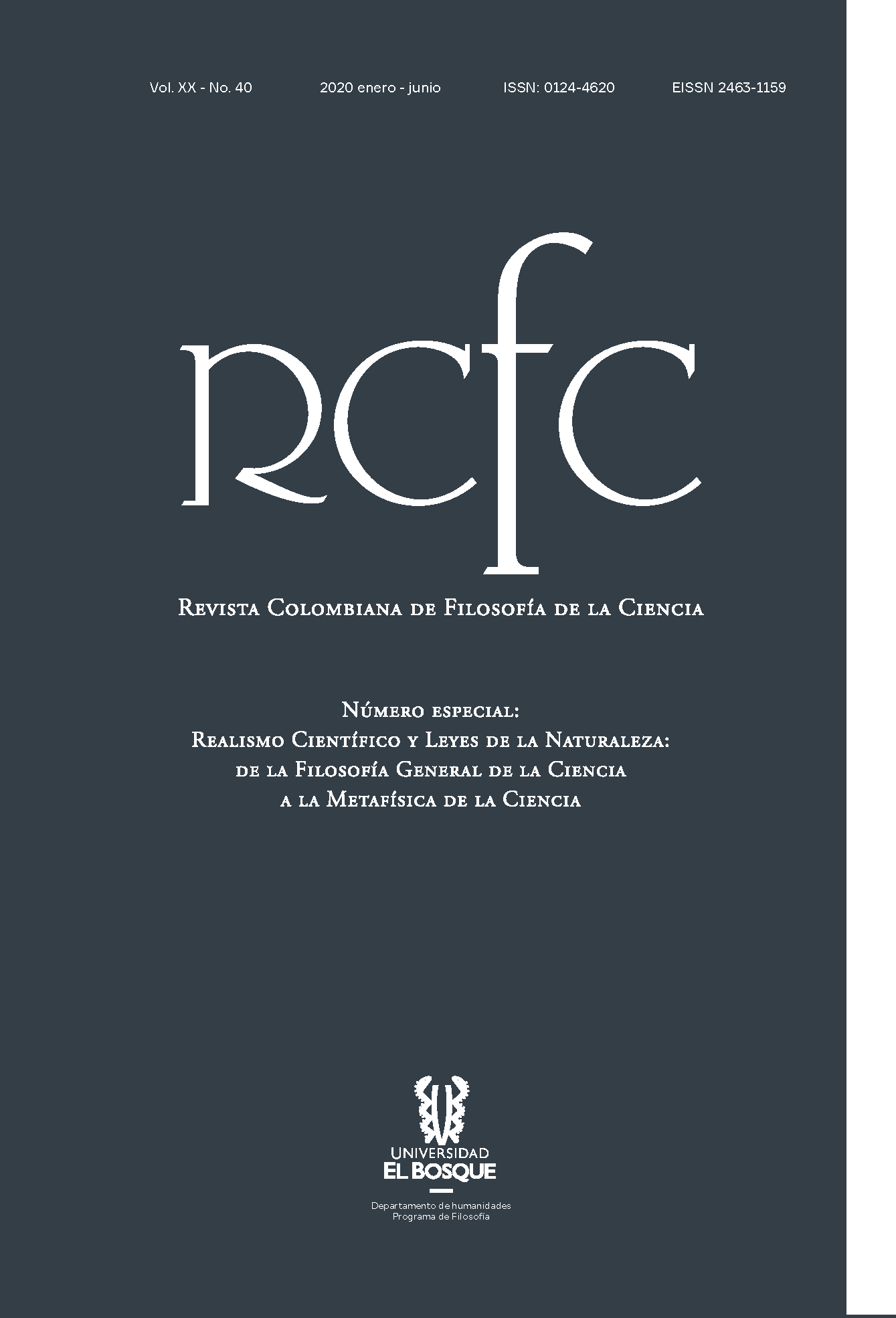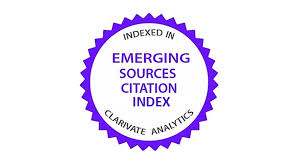Wigner, las leyes físicas y la efectividad de las matemáticas
DOI:
https://doi.org/10.18270/rcfc.v20i40.3233Palabras clave:
leyes físicas, efectividad de las matemáticas, Wigner, contingencia, invariancia, empirismo, teoría del mapeoResumen
Contamos con diversas estrategias para explicar el problema de Wigner, el cual se relaciona con la efectividad incomprensible (unreasonable effectiveness) de las matemáticas en la formulación de leyes físicas. Tras algunas consideraciones introductorias, reconstruiré el problema de Wigner señalando que una lectura cuidadosa de su obra filosófica nos ofrece razones para disipar los aires de misterios y milagros que parecen rodear la efectividad de las matemáticas. Para enfatizar la relevancia de las matemáticas en la formulación de leyes físicas, abordaré críticamente la tesis de que las leyes físicas son enunciados puramente matemáticos y la concepción algorítmica que sostiene que las leyes de la naturaleza son el software del universo. Avanzando más allá de tales propuestas, sugeriré reinterpretar el problema de Wigner en términos de la aplicación de estructuras matemáticas a la estructura relevante de dominios físicos en la formulación de leyes científicas. Tal reinterpretación nos permitirá proponer una aproximación empirista ampliamente deflacionaria al problema de Wigner, sistematizando brevemente diversas estrategias para explicar la efectividad de las matemáticas en la formulación de leyes.
Descargas
Referencias bibliográficas
Bueno, Otávio. “Structural Realism, Mathematics, and Ontology”. Studies in History and Philosophy of Science 74.1 (2019): 4-9. <https://doi.org/10.1016/j.shpsa.2018.12.005>
Bueno, Otávio y Mark Colyvan. “An Inferential Conception of the Application of Mathematics”. Nous 45.2 (2011): 345-374.
Bueno, Otávio y Steven French. Applying Mathematics. Immersion, Inference, Interpretation. Oxford: Oxford University Press, 2018.
Carroll, John, ed. Readings on Laws of Nature. Pittsburgh: University of Pittsburgh Press, 2004.
Cartwright, Nancy. The Dappled World. A Study of the Boundaries of Science. Cambridge: Cambridge University Press, 1999.
Colyvan, Mark. The Indispensability of Mathematics. Oxford: Oxford University Press, 2001.
Dieks, Dennis. “The Flexibility of Mathematics”. The Role of Mathematics in Physical Sciences: Interdisciplinary and Physical Aspects. Eds. Giovanni Biniolo, Paolo Budinich y Majda Trobok. Dordrecht: Springer, 2005. 115-129.
Dirac, Paul. “The Relation between Mathematics and Physics”. Proceedings of the Royal Society 59 (1939): 122-129.
Dorato, Mauro. “The Laws of Nature and the Effectiveness of Mathematics”. The Role of Mathematics in Physical Sciences: Interdisciplinary and Physical Aspects. Eds. Giovanni Biniolo, Paolo Budinich y Majda Trobok. Dordrecht: Springer, 2005a. 131-144.
_____. “Why Are (Most) Laws of Nature Mathematical?” Nature’s Principles. Eds. Jan Faye, Paul Needham, Uwe Scheffler y Max Urchs. Dordrecht: Springer, 2005b. 55-75.
_____. The Software of the Universe. An Introduction to the History and Philosophy of Laws of Nature. Aldershot: Ashgate, 2005c.
Dyson, Freeman. “Mathematics in the Physical Sciences”. Scientific American 211.3 (1962): 128-146.
Einstein, Albert. “Geometry and Experience”. Sidelights on Relativity. London: Methuen, 1922. 27-56.
Feynman, Richard. The Character of a Physical Law. London: Penguin Books, 1965.
French, Steven. The Structure of the World: Metaphysics & Representation. Oxford: Oxford University Press, 2014.
Hilbert, David. Natur und mathematisches Erkennen. Birkhäusser: Basel, 1992.
Islami, Arezoo. “A Match not Made in Heaven: on the Applicability of Mathematics in Physics”. Synthese 194.1 (2017): 4839-4861.
Islami, Arezoo y Harald Wiltsche. “A Match Made on Earth. On the Applicability of Mathematics in Physics”. Phenomenological Approaches to Physics. Eds. P. Berghofer y H. Wiltsche. Cham: Springer, 2020. 1-21.
Kant, Immanuel. Metaphysical Foundations of the Natural Science. 1786. Cambridge: Cambridge University Press, 2004.
Nguyen, James y Roman Frigg. “Mathematics is not the Only Language in the Book of Nature”. Synthese (2017). <https://doi.org/10.1007/s11229-017-1526-5>
Ott, Walter y Lydia Patton. Laws of Nature. Oxford: Oxford University Press, 2018.
Pincock, Christopher. “A New Perspective on the Problem of Applying Mathematics”. Philosophia Mathematica 3.12 (2004): 135-161.
_____. “A Role for Mathematics in the Physical Sciences”. Nous 41.2 (2007): 253-275.
_____. “Mathematical Structural Realism”. Scientific Structuralism. Eds. Peter Bokulich y Alisa Bokulich. Dordrecht: Springer, 2011. 67-79.
_____. Mathematics and Scientific Representation. Oxford: Oxford University Press, 2012.
Psillos, Stathis. “Anti-Nominalistic Scientific Realism: a Defense”. Properties, Powers, and Structures. Issues in the Metaphysics of Realism. Eds. Alexander Bird, Brian Ellis y Howard Sankey. New York-London: Routledge, 2012. 63-80.
Soto, Cristian. “Mark Colyvan, an Introduction to the Philosophy of Mathematics”. Crítica: Revista Hispanoamericana de Filosofía 46.138 (2014): 93-102.
Soto, Cristian. “The Epistemic Indispensability Argument”. Journal for General Philosophy of Science 50 (2019): 145-161.
Soto, Cristian y Otávio Bueno. “A Framework for an Inferential Conception of Physical Laws”. Principia: An International Journal of Epistemology 23. 3 (2019): 423-444.
Steiner, Mark. “The Applicabilities of Mathematics”. Philosophia Mathematica 3.1 (1995): 129-156.
_______. The Applicability of Mathematics as a Philosophical Problem. Cambridge, MA- London: Harvard University Press, 1998.
Tegmark, Max. Our Mathematical Universe. My Quest for the Ultimate Nature of Reality. London: Penguin Books, 2014.
Weinberg, Steven. Dreams of a Final Theory. London: Vintage, 1993.
Wenmackers, Sylvia. “Children of the Cosmos”. Trick or Truth. The Mysterious Connection between Physics and Mathematics. Eds. A. Aguirre, B. Foster y Z. Merali. Dordrecht: Springer, 2017. 5-20.
Wigner, Eugene. “The Unreasonable Effectiveness of Mathematics in the Natural Sciences”. Communications on Pure and Applied Mathematics 13 (1960): 1-14.
______. “Events, Laws of Nature, and Invariance Principles”. 1967. The Collected Works of Eugene Paul Wigner, Part B. Historical, Philosophical, and Socio-Political Papers. Vol. IV. Dordrecht: Springer, 1995a. 321-333.
______. “Invariance in Physical Theory”. 1967. The Collected Works of Eugene Paul Wigner, Part B. Historical, Philosophical, and Socio-Political Papers. Vol. IV. Dordrecht: Springer, 1995b. 283-293.
______. “Symmetry and Conservation Laws”. 1967. The Collected Works of Eugene Paul Wigner, Part B. Historical, Philosophical, and Socio-Political Papers. Vol. IV. Dordrecht: Springer, 1995c. 297-310.
______. “Symmetry in Nature”. 1973. The Collected Works of Eugene Paul Wigner, Part B. Historical, Philosophical, and Socio-Political Papers. Vol. IV. Dordrecht: Springer, 1995d. 382-411.
______. “Symmetry Principles in Old and New Physics”. 1968. The Collected Works of Eugene Paul Wigner, Part B. Historical, Philosophical, and Socio-Political Papers. Vol. IV. Dordrecht: Springer, 1995e. 359-381.
______. “The Role of Invariance Principles in Natural Philosophy”. 1967. The Collected Works of Eugene Paul Wigner, Part B. Historical, Philosophical, and Socio-Political Papers. Vol. IV. Dordrecht: Springer, 1995f. 311-320.
Wilson, Mark. “The Unreasonable Uncooperativeness of Mathematics in the Natural Sciences”. The Monist 83.2 (2000): 296-314.
Woodward, James. “Physical Modality, Laws, and Counterfactuals”. Synthese 197.1 (2017) 1907-1929. <https://doi.org/10.1007/s11229-017-1400-5>
______. “Laws: An Invariance-Based Account”. Laws of Nature. Eds. Walter Ott y Lydia Patton. Oxford: Oxford University Press, 2018. 158-180.
Descargas
Publicado
Cómo citar
Número
Sección
| Estadísticas de artículo | |
|---|---|
| Vistas de resúmenes | |
| Vistas de PDF | |
| Descargas de PDF | |
| Vistas de HTML | |
| Otras vistas | |












